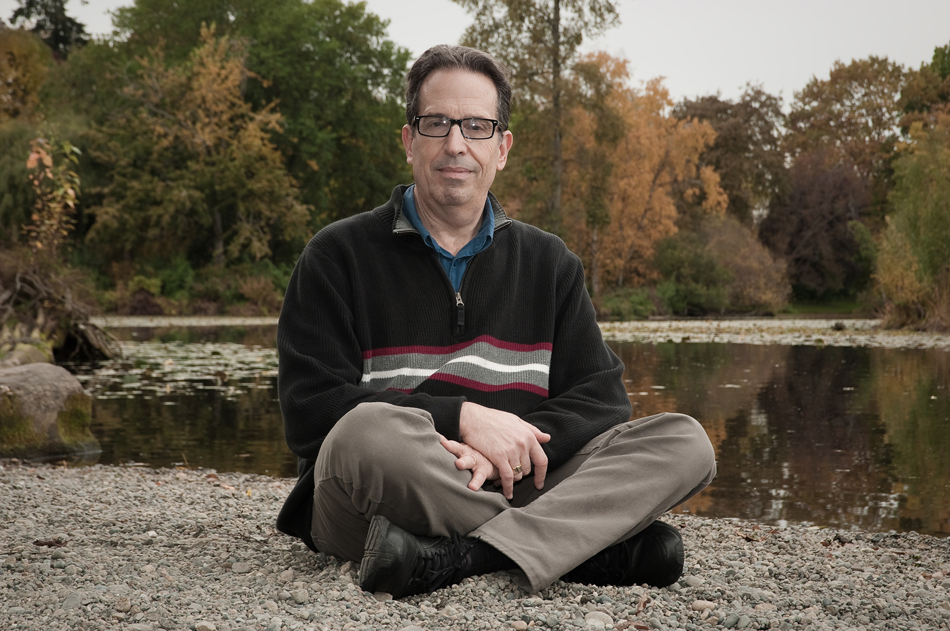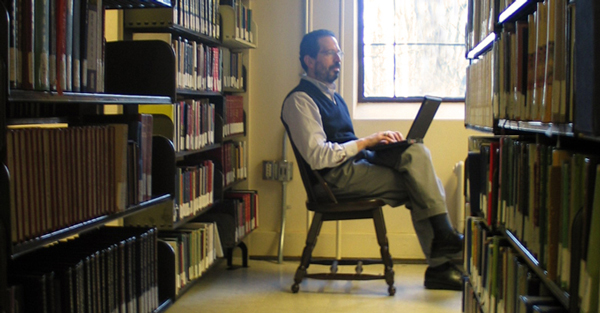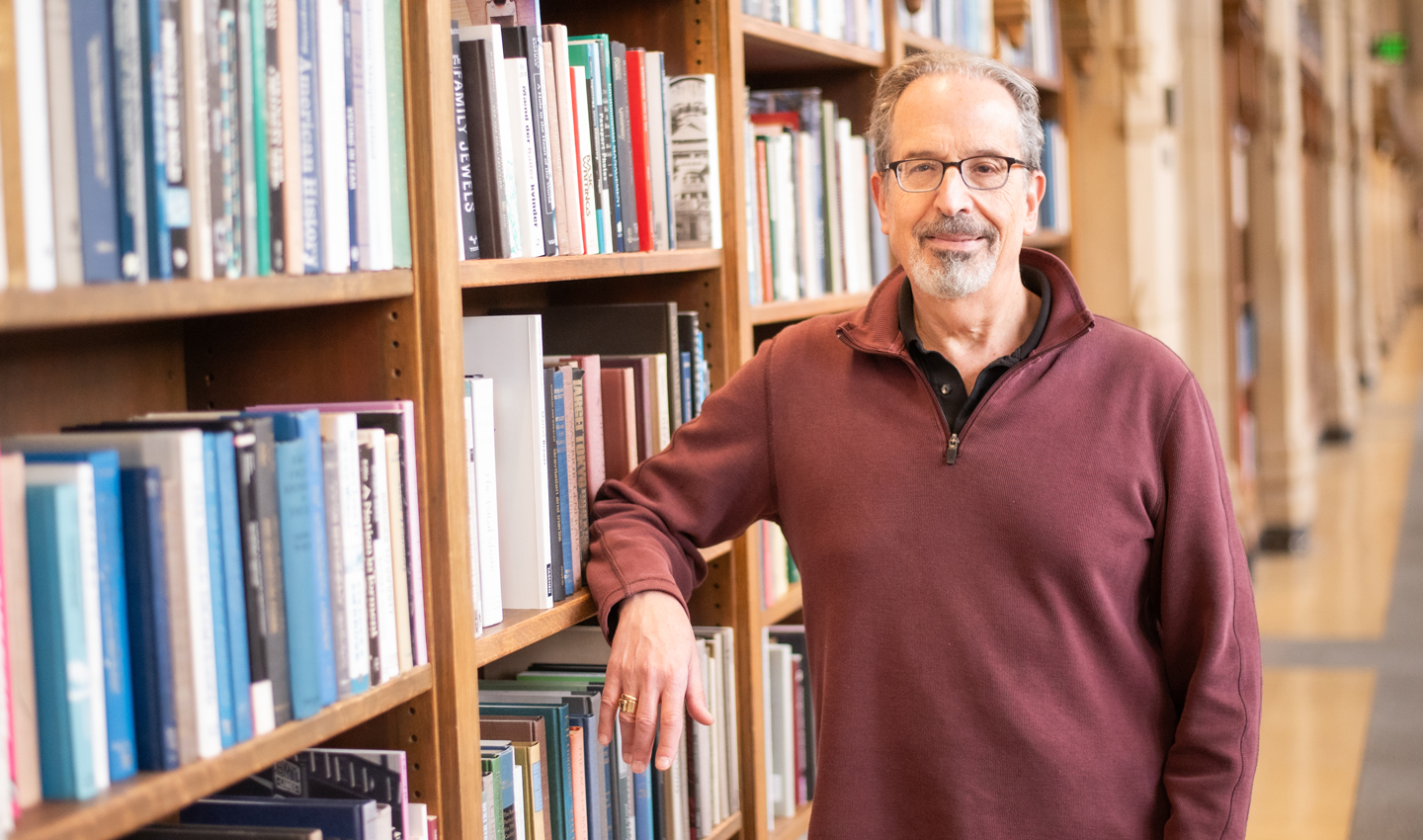Fresh off a prestigious job with a Silicon Valley think tank, David Levy came to the UW iSchool in 2000 with a radical idea: What would it mean to look at technology from a contemplative perspective?
“I’ve spent more than 20 years trying to answer that question,” says the recently retired professor emeritus, a computer scientist and meditator who made headlines when he first introduced contemplative practices into his iSchool classroom in 2006.
Students embraced the slower approach to learning, practicing intentional breathing and taking meditative walks to quiet and focus minds. For some, Levy’s guidance was life-changing. “What I learned from David is basically a way of being in the world and that is a thousand lessons: how to pay attention, how to hold space for others, how to think and feel and be,” says former doctoral student Beck Tench, now a senior researcher and designer for the Center for Digital Thriving at Harvard Graduate School of Education.
But Levy’s unusual approach to learning – incorporated in many classrooms today – was ahead of its time. “Critics said it was not serious enough, too touchy-feely, too new age-y,” says Levy, who is writing a book about the kind of wisdom needed to help guide our technology-saturated society.
Levy’s writings and lectures reveal how this info-overloaded world has left us distracted, fragmented, with little time to think, struggling with what he once termed “popcorn brain” — a mind flinging thoughts in all directions. Click! New Instagram. Clack! Six emails, half spam. Ping! Scientific blog on X. Look here: Games, adverts, texts!
In all the noise, Levy has quietly been imagining and working toward a more contemplative university. He envisions it as a kind of sanctuary where deep thinking and reflection are given greater priority and where digital tools more fully serve this mission. This immersive environment can lead scholars and students and the public at large to states of “ah-ha” and wonder, says Levy, whose book “Mindful Tech: How to Bring Balance to Our Digital Lives” (Yale University Press, 2016) is a practical guide to living a healthy, attentive life in our buzzing high-tech world.
“I am concerned that we are making too small a world for ourselves. The wrong things are prioritized and we no longer claim space and time for being over doing,” he says.

Levy’s feet are planted solidly in both the fast and slow worlds. The native New Yorker, who was already programing computers as a teen, received his bachelor’s degree in pure mathematics from Dartmouth College, where he was valedictorian of his class of 1971. He moved on to Stanford University in California, earning master’s and doctoral degrees in computer science, with a concentration on early artificial intelligence and natural language processing.
In the early ‘80s, Levy’s path took an unexpected turn. Needing to expand his horizons beyond Silicon Valley, he moved to London to attend the Roehampton Institute and study the quaint medieval art of calligraphy. He found joy in slowly bringing together ink, pen, paper, forming letters, falling into a timeless state of mind. “Calligraphy helped me to concentrate, to enter more fully into my body,” says Levy. “It was my first contemplative practice.”
When he returned from London, he joined the Xerox Palo Alto Research Center think tank in Silicon Valley, where he focused on making sense of documents in the digital age. One day, while sitting in meditation, he had an epiphany that would shape his future work. It might be possible, he thought, to bring together his contemplative life and his intellectual life. He could bring “the spirit of calligraphy into the digital age.”
“I came to understand that my journey from Silicon Valley to England had been a kind of pilgrimage to the place where the Industrial Revolution had begun and where the Arts & Crafts movement, including calligraphy, had emerged in response, as a corrective,” he says.
Levy has written extensively about the need for “contemplative scholarship” in academic settings. “There’s a difference between thinking from the outside and from the inside, where you are being alive in the middle of thinking,” he says. “When you’re inside the work, you are intimately connected to it. You’re not just investigating subject matter, you’re investigating yourself in relation to that subject matter.”

Levy is a model of the contemplative scholar, addressing complex questions in depth, with rigor and without compromise, says iSchool Associate Professor Emerita Cheryl Metoyer, who directed the iNative research group at the school and spent long hours in conversation with Levy over the years. “David’s work is trustworthy. When I read his work, I sense his search for the truth. As we ask in Indian Country, ‘Does the center of the story hold true?’ With David, it does.”
Levy brought the same depth to his classroom, where he focused on what he describes as “teaching, not training.” Despite the tremendous challenges, he managed to carve out time to meet one-on-one with almost every student, engaging with them, being present with them, establishing meaningful relationships with them. “David exemplified how to nurture connection,” says Megan Kennedy, director of the UW Resilience Lab.
Levy helped develop the Resilience Lab and still serves on its external board of directors as an advisor. The lab was formed in 2015 to address an epidemic of student anxiety and depression on campus, providing students, staff and instructors with training and tools to build self-awareness and well-being. “David’s commitment to the lab has never wavered and his steadiness as a mentor and advisor was an essential anchor for the lab and for me,” says Kennedy.
In their coursework, Levy’s students had to closely examine their own online lives, observing and critiquing their email and social media habits and behaviors. Noted one student: “We’re really unconscious when we use technology; this class is helping bring that consciousness back – of just how zoned out I am.”
Levy was struck by students’ unheard reservations about technology. “They had concerns and revelations that we were not giving them credit for,” he says. “We had not been listening hard enough.”
The tech thought leader has shared his insights and mindful practices on campus and off – including churches, libraries, medical settings, and other college campuses. He helped organize lectures, webinars, training workshops and conferences with titles such as “Mindful Work and Technology” at the Library of Congress in 2006 and “Information, Silence and Sanctuary,” a three-day conference in 2004 at the UW that brought together composers, artists, storytellers, monks, philosophers, software developers, doctors and others to examine the intersection of humanity and technology.
Levy retired this past December and moved back to the Bay Area, where his wife serves as a rabbi in a local Jewish community. Levy practices both traditional Judaism and daily meditation, looking out over a rolling green valley as he relaxes his body, attends to the rhythm of his breathing and the calming of his mind.
Reflecting on his long journey, he says he is grateful to the iSchool for providing a platform and support for his ideas. Asked what he is most proud of over his years at the UW, the answer is simple and telling. “I am proud that I’ve stayed true to the spirit of inquiry that emerged 30 years ago, and that I have continued to cultivate it with and for others.”
